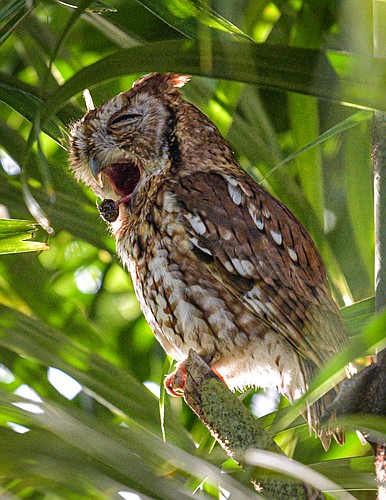- April 4, 2025
-
-
Loading

At 6-10 inches tall, Eastern screech owls are Florida's smallest owls. These tiny owls are more often heard than seen, as their coloring and feather tufts on the tops of their heads (often mistaken for ears), allow them to blend into their surroundings, perfectly camouflaged.
Despite their name, these raptors do not screech; their calls feature horse-like whinnies and soft trills. They sleep during the day, roosting in tree cavities or dense foliage, becoming active at dusk and at night, when they forage for food. Screech-owls mostly hunt from a perch with a clear path to the ground, from which they swoop down on their prey, which they locate by sight or sound.
Meet the other birds of the week
Found in all types of wooded habitats, including suburban backyards, screech-owls nest in tree cavities, often using abandoned woodpecker holes, or natural cavities in older trees or snags. Like many birds that depend on cavities for nesting, habitat loss, removal of older trees and aggressive tree trimming has made it harder for them to find suitable nesting sites.
Screech owls will happily move into artificial nest boxes. They prefer nesting boxes mounted high in a thick tree, with easy access. They also prefer ample foliage and shade nearby, which allows the male owl to safely roost near the box during and after incubation. Screech owls are great neighbors: They're fun to observe, and they prey on rodents and roaches, therefore providing natural pest control. However, as they're easily poisoned by eating rodents exposed to toxins, forgoing poisons in our environment and letting owls, and other raptors, keep pests in check, will help keep all our birds safe and healthy.
Save our Seabirds is a non-profit organization whose mission is to rescue and rehabilitate sick and injured birds, releasing as many as they can, while educating our community about avoiding injuries and preserving habitats.